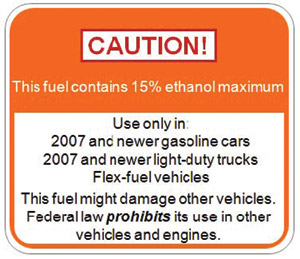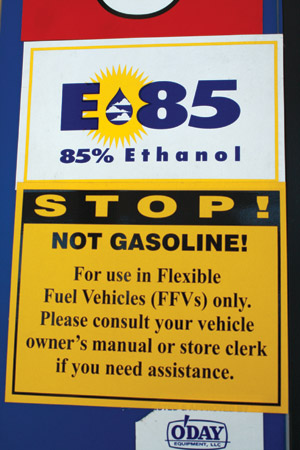It's How You Say It



December 27, 2010
BY Kris Bevill
While overwhelming scientific evidence suggests E15 is perfectly acceptable for use in vehicle models 2001 and newer, consumers won't see scientific reports when they pull up to the gas pump. Instead, their fuel purchase will be heavily influenced by one small square piece of paper. The power of that label's language is not being overlooked by ethanol and petroleum industry members as they file comments on the U.S. EPA's proposed E15 label before the Jan. 3 deadline.
During a public hearing held by the U.S. EPA Nov. 16 in Chicago, Ron Lamberty, vice president and director of market development for the American Coalition of Ethanol, reminded EPA officials of the issues that resulted from the "surgeon general-style warning labels" used by retailers when E10 was introduced. "That type of labeling primarily served to cause doubt in consumers, create false fears and form irrational linkages to problems that had no relation to ethanol," he said. "That fear gave unscrupulous mechanics and repairmen an opportunity to take advantage of concerned customers by charging them for mysterious problems supposedly caused by 'gasohol.' … The issue of labeling is significant to the ethanol industry, and history shows that ethanol labels cause as many problems-and maybe more problems-than ethanol itself."
The ethanol industry prefers a white E15 label that does not include a warning about possible damage to vehicles. Industry representatives believe it is fair to omit this warning because there is no conclusive evidence that E15 could cause damage to unapproved vehicles. Lamberty says including the word "damage" on the label would validate unsubstantiated claims. ACE's alternative suggestion is a statement which informs consumers that using E15 in unapproved vehicles is a violation of federal law.
John Eichberger, vice president of government relations for the National Association of Convenience Stores, says his group is not anti-E15. Rather it is focused on enabling its members to profitably sell E15 and to dissuade misfueling. He urged the agency to convene a conference of stakeholders to address legal concerns before the rule is finalized.
Growth Energy CEO Tom Buis expressed confidence in consumers and said he believes the EPA will design a fair label. "Many consumers today are required to use premium fuel, and diesel drivers have a bifurcated market that requires them to be educated about their fuel choices at the pump," he said. "Consumers are capable of reading a label. They have been doing it for years."
Over 1,000 comments had been filed by mid-November, demonstrating the need for careful language. Many comments from private citizens indicated concern that the EPA's approval of E15 is a mandate and that using the fuel will damage their vehicles.
Advertisement
Advertisement
Advertisement
Advertisement
Upcoming Events





